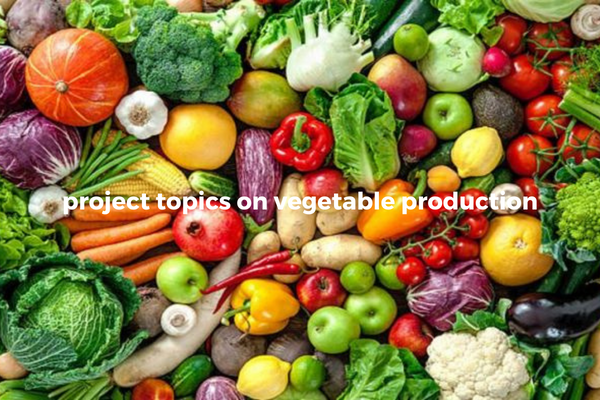If you are doing some research on agriculture, chances are you may be looking for topics related to vegetable production or farming.
Vegetable production or farming is the growing of vegetables for human consumption. Vegetables are an important part of the human diet. They have been grown for thousands of years, as far back as man exists.
Vegetable production is an important part of the agriculture activity as it provides economic opportunity asides the obvious nutritional values.
If you are tasked with research on vegetable production you can check our page for Thesis, Dissertations and Projects on Vegetable Production
Below are sample research or project topics on vegetable production/farming;
(a) Socioeconomic Analyses Of Vegetable Production And Marketing In Tamale, Northern Region
Globally, vegetable production and marketing serve as a source of livelihood for both urban and rural poor and contribute tremendously to food security. This study evaluates the social and economic relationships between vegetable farmers and marketers as well as the production and marketing related problems that limit farmers and marketers from getting potential benefits across seasons in the Tamale Metropolis.
In Kenya, there are more than 200,000 farmers who have been trained on organic farming technologies and systems. Currently certified land under organic management in Kenya stands at 104,211 ha while the organic sub sector employs 12,647 farmers who are directly involved in production of different organic products. Although there are many documented reasons that make farmers to adopt organic farming system, economic benefits present one of the major motivations.
There are lots of constraints facing dry season vegetable production in Nigeria which can be corrected using the group-based extension services platform. Previous studies have focused on individual extension approaches that can only attend to one farmer at a time, thus limiting information dissemination. This study, therefore, investigated the effects of Farmers-Field School (FFS) and Demonstration Extension Methods (DEM) on knowledge and production of vegetables among dry season farmers in Southwestern Nigeria
(d) Factors Influencing The Adoption of Organic Fertilizers in Vegetable Production in Accra
Continuous tillage of soils results in nutrient mining. It leaves the soils in very fragile conditions and therefore nutrient augmentation through the application of fertilizers has become imperative to maintain crop yields to feed the ever-growing population of Ghana. The use of organic fertilizers has its pros and cons. This study sought to determine the factors that influence the adoption of organic fertilizers, in vegetable production in Accra.
Reuse of wastewater for vegetable irrigation is common in developing countries due to its accessibility and being rich in fertilizing elements thus improving crops yield. Regardless of these advantages, the practice plays an important role in transmission of intestinal parasitic helminths to vegetable consumers
(f) Effect Of Certified Organic Production Systems On The Livelihood Of Smallholder Farmers In Kenya
The main objective of the study was to assess the effect of certified organic production systems on the livelihood of smallholder producers in Kenya. The study followed explanatory research design using two purposively pro-poor chosen case studies (honey production in Mwingi district and vegetables production in Ngong district). Collection of primary data was through face-to-face interviews using pre-tested semi-structured questionnaire.
A new agronomic practice known as integrated crop management (ICM) technology is a combination of best farming practices to create a favorable environment thereby discouraging the use of the conventional method of farming. The main objective of this study is to compare the costs and benefits of using the integrated crop management technology and the conventional method.
